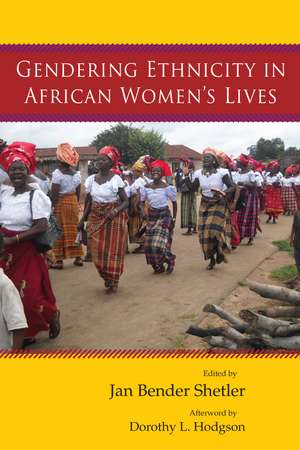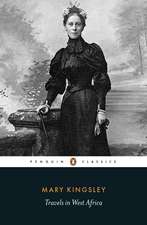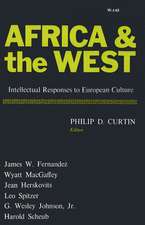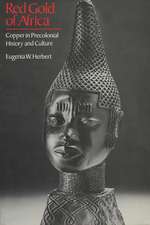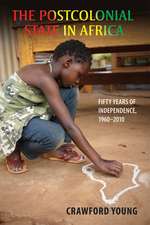Gendering Ethnicity in African Women’s Lives: Women in Africa and the Diaspora
Editat de Jan Bender Shetleren Limba Engleză Paperback – 4 mai 2015
Do African men and women think about and act out their ethnicity in different ways? Most studies of ethnicity in Africa consider men’s experiences, but rarely have scholars examined whether women have the same idea of what it means to be, for example, Igbo or Tswana or Kikuyu. Or, studies have invoked the adage “women have no tribe” to indicate a woman’s loss of ethnicity as she marries into her husband’s community. This volume engages directly the issue of women’s ethnicity and makes stimulating contributions to debates about how and why women’s movements have a unifying role in African political organization and peace movements.
Drawing on extensive field research in many different regions of Africa, the contributors demonstrate in their essays that women do make choices about the forms of ethnicity they embrace, creating alternatives to male-centered definitions—in some cases rejecting a specific ethnic identity in favor of an interethnic alliance, in others reinterpreting the meaning of ethnicity within gendered domains, and in others performing ethnic power in gendered ways. Their analysis helps explain why African women may be more likely to champion interethnic political movements while men often promote an ethnicity based on martial masculinity. Bringing together anthropologists, historians, linguists, and political scientists, Gendering Ethnicity in African Women’s Lives offers a diverse and timely look at a neglected but important topic.
Drawing on extensive field research in many different regions of Africa, the contributors demonstrate in their essays that women do make choices about the forms of ethnicity they embrace, creating alternatives to male-centered definitions—in some cases rejecting a specific ethnic identity in favor of an interethnic alliance, in others reinterpreting the meaning of ethnicity within gendered domains, and in others performing ethnic power in gendered ways. Their analysis helps explain why African women may be more likely to champion interethnic political movements while men often promote an ethnicity based on martial masculinity. Bringing together anthropologists, historians, linguists, and political scientists, Gendering Ethnicity in African Women’s Lives offers a diverse and timely look at a neglected but important topic.
Din seria Women in Africa and the Diaspora
-
 Preț: 270.56 lei
Preț: 270.56 lei -
 Preț: 209.30 lei
Preț: 209.30 lei -
 Preț: 163.65 lei
Preț: 163.65 lei -
 Preț: 205.65 lei
Preț: 205.65 lei -
 Preț: 232.09 lei
Preț: 232.09 lei -
 Preț: 232.29 lei
Preț: 232.29 lei - 23%
 Preț: 478.76 lei
Preț: 478.76 lei -
 Preț: 235.78 lei
Preț: 235.78 lei -
 Preț: 223.77 lei
Preț: 223.77 lei -
 Preț: 208.49 lei
Preț: 208.49 lei - 23%
 Preț: 473.13 lei
Preț: 473.13 lei - 23%
 Preț: 477.99 lei
Preț: 477.99 lei - 23%
 Preț: 476.36 lei
Preț: 476.36 lei - 14%
 Preț: 185.36 lei
Preț: 185.36 lei - 21%
 Preț: 378.04 lei
Preț: 378.04 lei -
 Preț: 182.07 lei
Preț: 182.07 lei -
 Preț: 230.50 lei
Preț: 230.50 lei -
 Preț: 199.67 lei
Preț: 199.67 lei
Preț: 432.86 lei
Nou
Puncte Express: 649
Preț estimativ în valută:
82.83€ • 88.57$ • 69.06£
82.83€ • 88.57$ • 69.06£
Carte tipărită la comandă
Livrare economică 17 aprilie-01 mai
Preluare comenzi: 021 569.72.76
Specificații
ISBN-13: 9780299303945
ISBN-10: 0299303942
Pagini: 348
Dimensiuni: 152 x 229 x 23 mm
Greutate: 0.51 kg
Ediția:1
Editura: University of Wisconsin Press
Colecția University of Wisconsin Press
Seria Women in Africa and the Diaspora
ISBN-10: 0299303942
Pagini: 348
Dimensiuni: 152 x 229 x 23 mm
Greutate: 0.51 kg
Ediția:1
Editura: University of Wisconsin Press
Colecția University of Wisconsin Press
Seria Women in Africa and the Diaspora
Recenzii
“An important, original, and timely anthology bringing a feminist scholarly perspective to the workings of ethnicity and women’s lives in Africa.”—Victoria Bernal, University of California, Irvine
“This volume fills a long-overdue need for a book-length treatment of the nexus of gender and ethnicity.”—Monica Udvardy, University of Kentucky
“For the historian, these musings on sources, memory, and historiographic silences provide a highly stimulating invitation to rethink our approach to the history of identity in Africa. A very fine historically nuanced collection.”—Barbara M. Cooper, Rutgers University
“A critical contribution to our understanding of the creation and practice of ethnicity in African societies.”—Elizabeth Schmidt, Loyola University Maryland
“By insisting that gender is central to our understanding of ethnicity, and interrogating the past with a focus on gendered ethnicity, this collection makes an important contribution to the field of African studies. . . . The insights contained in this book are of significance to scholars not only of Africa, but of other regions of the world as well.”—African Studies Review
Notă biografică
Jan Bender Shetler is a professor of history at Goshen College. She is the author of Imagining Serengeti and Telling Our Own Stories: Local Histories from South Mara, Tanzania.
Cuprins
Acknowledgments
Introduction: Women’s Alternative Practices of Ethnicity in Africa
Jan Bender Shetler
Part I
Forming Interethnic Alliances
1 Gendering the History of Social Memory in the Mara Region, Tanzania, as an Antidote to “Tribal” History
Jan Bender Shetler
2 Living Ethnicity: Gender, Livelihood, and Ethnic Identity in Mozambique
Heidi Gengenbach
Part II
Constructing New Forms of Identity
3 Re-reading the 1835 “Fingo Emancipation”: Women and Ethnicity in the Colonial Archive
Poppy Fry
4 New African Marriage and Panethnic Politics in Segregationist South Africa
Meghan Healy-Clancy
5 Women and Non-ethnic Politics in East Africa, 1934–1947
Ethan R. Sanders
Part III
Promoting Gendered Domains of Ethnicity
6 Gender and the Limits of “Ndebeleness,” 1910–1960s: Abezansi Churchwomen’s Domestic and Associational Alliances
Wendy Urban-Mead
7 “Women Were Not Supposed to Fight”: The Gendered Uses of Martial and Moral Zuluness during uDlame, 1990–1994
Jill E. Kelly
8 Sorting and Suffering: Social Classification in Postgenocide Rwanda
Jennie E. Burnet
Part IV
Performing Gendered Ethnic Power
9 Matriliny, Masculinity, and Contested Gendered Definitions of Ethnic Identity and Power in Nineteenth-Century Southeastern Nigeria
Ndubueze L. Mbah
10 Shaming Men, Performing Power: Female Authority in Zimbabwe and Tanzania on the Eve of Colonial Rule
Heike I. Schmidt
11 Muslim Women Legislators in Postcolonial Kenya:
Between Gender, Ethnicity, and Religion
Ousseina D. Alidou
Afterword: Reflections on Gender, Ethnicity, and
Power
Dorothy L. Hodgson
Suggestions for Further Reading
Contributors
Index
Introduction: Women’s Alternative Practices of Ethnicity in Africa
Jan Bender Shetler
Part I
Forming Interethnic Alliances
1 Gendering the History of Social Memory in the Mara Region, Tanzania, as an Antidote to “Tribal” History
Jan Bender Shetler
2 Living Ethnicity: Gender, Livelihood, and Ethnic Identity in Mozambique
Heidi Gengenbach
Part II
Constructing New Forms of Identity
3 Re-reading the 1835 “Fingo Emancipation”: Women and Ethnicity in the Colonial Archive
Poppy Fry
4 New African Marriage and Panethnic Politics in Segregationist South Africa
Meghan Healy-Clancy
5 Women and Non-ethnic Politics in East Africa, 1934–1947
Ethan R. Sanders
Part III
Promoting Gendered Domains of Ethnicity
6 Gender and the Limits of “Ndebeleness,” 1910–1960s: Abezansi Churchwomen’s Domestic and Associational Alliances
Wendy Urban-Mead
7 “Women Were Not Supposed to Fight”: The Gendered Uses of Martial and Moral Zuluness during uDlame, 1990–1994
Jill E. Kelly
8 Sorting and Suffering: Social Classification in Postgenocide Rwanda
Jennie E. Burnet
Part IV
Performing Gendered Ethnic Power
9 Matriliny, Masculinity, and Contested Gendered Definitions of Ethnic Identity and Power in Nineteenth-Century Southeastern Nigeria
Ndubueze L. Mbah
10 Shaming Men, Performing Power: Female Authority in Zimbabwe and Tanzania on the Eve of Colonial Rule
Heike I. Schmidt
11 Muslim Women Legislators in Postcolonial Kenya:
Between Gender, Ethnicity, and Religion
Ousseina D. Alidou
Afterword: Reflections on Gender, Ethnicity, and
Power
Dorothy L. Hodgson
Suggestions for Further Reading
Contributors
Index
Descriere
The elegists, ancient Rome’s most introspective poets, filled their works with vivid, first-person accounts of dreams. Emma Scioli examines these varied and visually striking textual dreamscapes, arguing that the poets exploited dynamics of visual representation to share with readers the intensely personal experience of dreaming.
